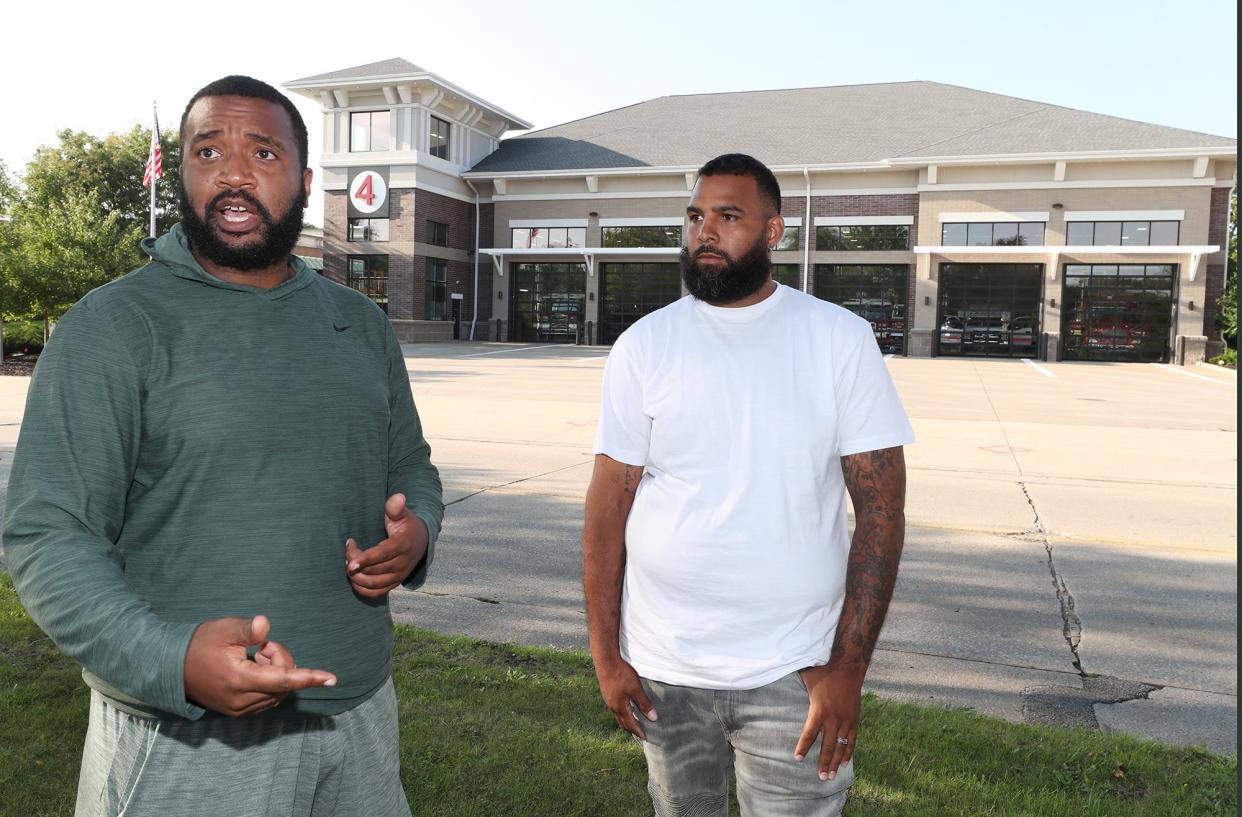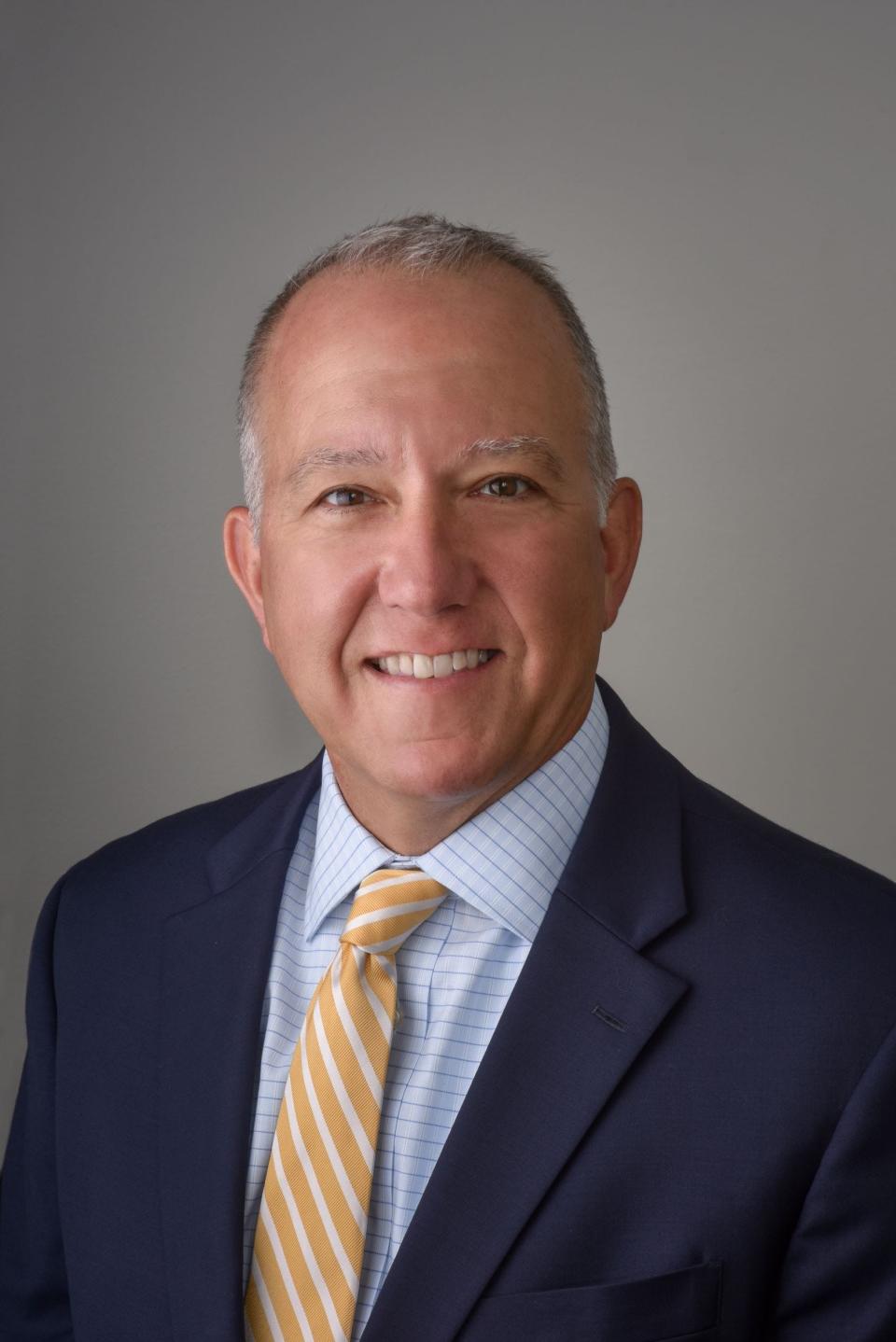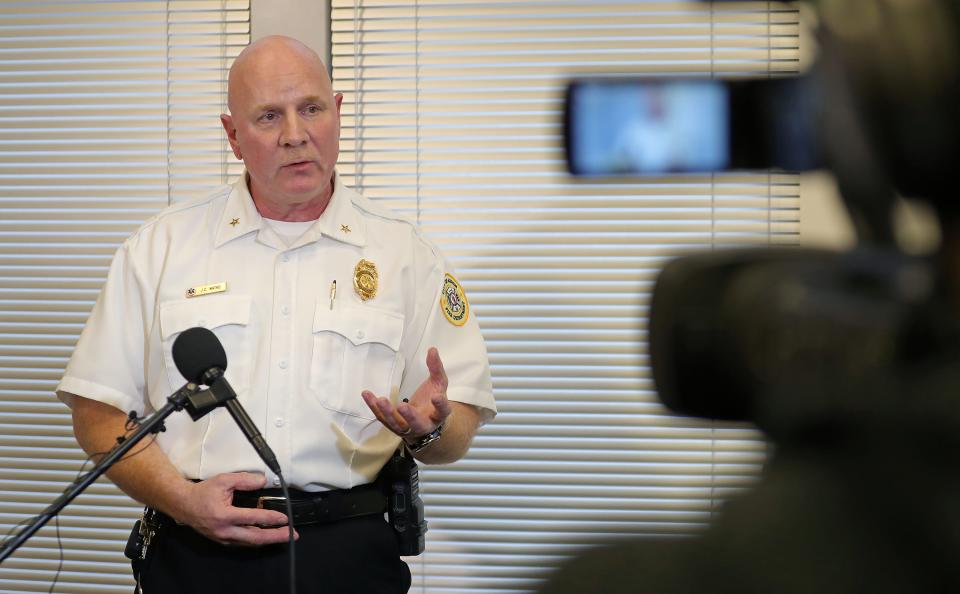'Candidates got screwed': City hiring glitches disqualify Black firefighter applicants

Bryan Taylor ignored a job opening for five months waiting on the Akron Fire Department to start hiring.
He’s the kind of candidate the city wants — a lifelong Akron resident with six years in the Marines and a nearly spotless criminal record. And he’s Black.
From the mayor to his safety directors and the top brass in the fire and police departments, city officials have pushed for first responders who reflect the people they serve. About 30% of the city but only 15% of firefighters and a slightly higher percent of police officers are Black. With Black officers and firefighters hired in the 1990s now retiring, diversity has slipped in recent years.
But administrators now question how polygraph tests and recent marijuana use might be disproportionately disqualifying good Black candidates, according to interviews with city officials and job applicants, and statements made in an active investigation into questionable hiring practices in the fire department.
At the heart of that investigation is whether Capt. Sierjie Lash “coached” candidates to avoid being disqualified for using marijuana after turning in their applications, and whether her boss, Deputy Chief Leon Henderson, retaliated against a background investigator who tried to blow the whistle.
Taylor said he was in the room with other job applicants when Lash talked openly about a botched rollout of the new hiring rules meant to make it easier to hire people who’ve recently used marijuana. The previous rule prohibited marijuana use six months before the city posted the job opening, which few could know six months in advance.
Lash is accused of taking candidates into private room and emerging with rewritten personal history statements that fudge the dates on the last time they used marijuana.
But Taylor said no one in the room with him was coached. Instead, he said, Lash explained that the city’s Human Resources Department was late getting the Fire Department a draft of the new rules.
“I didn't feel like she was ‘coaching’ you, basically trying to tell us, ‘Well, don't say this and don't say that,’” he said. “She was just making a point that she herself just got the list” of disqualifying factors under the city’s new hiring rules on marijuana use.
Lash was clarifying to candidates who thought they were in the clear that they should have stopped smoking marijuana months earlier, he said.
Of the 1,119 people who applied for the 35 open firefighter positions, 28.5% identify as Black. Taylor said Lash told him 25 to 30 applicants, who like him had presumably made it past the drug, physical and written tests, would be knocked out of contention by the technical reading by managers in Human Resources, decreasing the city’s chances of hiring more qualified and Black candidates.
One candidate, who is Black, told the Beacon Journal that marijuana use is more commonplace in the Black community. Taylor knows that candidate and another who — like him — were removed from the eligibility list.
"We just all three of us happen to be Black," he said.
In an anonymous letter to the mayor, at least one candidate still in contention has threatened to sue if bumped down the hiring list by others with previously disclosed marijuana use. And restating the whole hiring process, which is already behind schedule, would force the fire department to use even more overtime to make twice as many hospital runs after a private ambulance company let its city contract expire in August and then closed its Akron operation.
Akron firefighter applicants cut for marijuana use might instead become a police officer
When he applied, Taylor wasn’t sweating the lie detector, the background check, the questions or previous marijuana use. He was just going to be honest.
“The thing they harped on was nobody is perfect,” he said.
He admitted to smoking marijuana on Jan. 4. Then he passed a drug test in February and again in August while enrolling in trucking school. The new administrative rule adopted by the city of Akron last year considers marijuana use differently than other drugs, which can't be touched for two years prior to applying for a city job. Marijuana, instead, could now be used up until seeking city employment.
“Over the last several years, we have engaged in ongoing review of our hiring and recruitment practices,” Mayor Dan Horrigan told the Beacon Journal. “Some changes to those practices include: raising the maximum age for new hires in both police and fire, creating a Recruiting Taskforce in the Akron Fire Department to recruit within diverse populations, and most recently, adjusting our general removal standards regarding marijuana use and posting removal standards online.”

Taylor thought he was in the clear. He was told he ranked 18th out of the 800 candidates after taking the written test on Feb. 18, when he was first told to stop smoking marijuana.
But the new rule, which human resources had failed to officially interpret until months after candidates applied, considers marijuana use to be unacceptable on or after the date of applying for a city job — not the Jan. 31 deadline to apply for the current class of 35 fire cadets.
Taylor diligently applied in October, months earlier than required.
He was told by email last month that he's out of the pool of firefighter candidates. He turned 35 in April, meaning he’ll likely be too old to reapply if the fire department seeks another pool of potential candidates.
But — and this is where Taylor said the irony of the city’s hiring rules are not lost on him — the police department takes cadets as old as 40. A week after being told his marijuana use precluded him from fighting fires, he applied to become a cop.
And since he still hasn’t smoked marijuana since Jan. 4, he’s got a solid chance of joining the police academy.
Polygraph test puts city employee on paid administrative leave
Ezekiel Hobdy could lose his city job for what he told fire investigators while applying to become a firefighter.
Hobdy, unlike Taylor, didn’t have the slightest concern about marijuana use, which he said is commonly accepted in the Black community. He’s passed five drug tests, he said, since being hired by the city in 2017 as a sanitation service worker. Some of those drug tests, due to more stringent requirements for people with commercial driver’s licenses, were random.
Hobdy’s issue, instead, is with the polygraph test, which was apparently an issue for administrators in charge of the hiring process.
“There's so many discrepancies in the whole process,” Hobdy said. “When we originally submitted our applications, we weren't supposed to take a polygraph. Then, in February, they told us that we were going to take a polygraph. Then they told us that it was up in the air. They still weren't sure."
The flip-flopping Hodby experienced tracks what fire investigators — who accuse Lash of coaching candidates — said in their written statements, which were requested by Fire Chief Joe Natko and obtained by the Beacon Journal. The city isn’t commenting on the internal investigation.
“The investigation is progressing but has not been finalized as of yet,” Natko told the Beacon Journal. “I’m keeping tabs on it, and the mayor has made it a priority to resolve.”

Deputy Chief Henderson, according to the testimony of an investigator, adamantly opposed the polygraphs.
One fire investigator told Natko that it wasn’t until May 17, three months after candidates took the written test to begin the screening process, that the investigators were told “to reach out to any and all polygraph companies in the area for pricing and availability. This was directed to be rushed and happen ASAP.”
After finding a company and beginning to schedule polygraph tests, the investigators said they got an email from Henderson ordering that all polygraph tests be cancelled “with no further explanation.”
On June 5, Henderson met with the investigators for a progress update. One investigator explained to the chief that Henderson said the entire hiring process would move faster without the polygraphs.
Henderson claimed he’d done his research and read all the polygraphs from the last round of hiring, the investigators recalled. He “gave several reasons why we weren’t going to do them including: demographics being affected differently, people can beat polygraphs and some bad candidates get through.”
The investigators said Henderson was not swayed by their argument that lying on polygraphs didn’t automatically disqualify candidates. It's what they admit to when hooked up to the machines that matter most, they said.
'I brought it up so that nobody would think that I was lying about anything'
Hooked up to the polygraph machine, Hobdy said he divulged more than he otherwise would have.
He doesn’t smoke marijuana, but his wife, who has a medical marijuana card, does. When asked if he ever purchased the drug, he explained that he’s registered in Ohio's Medical Marijuana Control Program to pick up her orders at dispensaries. And he once drove her to Michigan because recreationally approved marijuana there is cheaper than medical marijuana here.
He admitted to giving a family member’s phone number to someone who asked for it. He knew the person to be involved with drugs. But he didn’t pry. He just passed the number along.
He also talked about having a beer after work with a co-worker, which was off-the-clock, he said. And he once bought discounted clothes for his kids in a deal that seemed too good to be true. They might have been "boosted" — or stolen. So, he disclosed that, too.
“I brought it up so that nobody would think that I was lying about anything,” Hobdy said.
On July 20, nearly a month after the polygraph, Hobdy said a fire investigator told him he would be advancing to the next stage of the hiring process, which involves an interview with the chief. The next day, with no explanation, he was told by email that he was off the eligibility list.
Another month passed and Hobdy got a call from his union president on Aug. 22 informing him he city’s Labor Relations Department was concerned about potentially "felony" activity. The next day, Hobdy was placed on paid administrative leave while the city investigates his polygraph answers.
He’s refusing to go quietly. Too old to apply again to become a firefighter, he said he’ll hire a lawyer versed in labor law if the city tries to fire him his job in sanitation.
Taylor, who's trying to get his trucking license and still hopes to be an Akron police officer, said speaking up about the botched hiring process is more important than his personal ambitions.
"I’d rather it be out there," he said. "A lot of candidates got screwed, good candidates."
Reach reporter Doug Livingston at dlivingston@thebeaconjournal.com or 330-996-3792.
This article originally appeared on Akron Beacon Journal: Black Akron fire applicants blame disqualifications on hiring glitches

